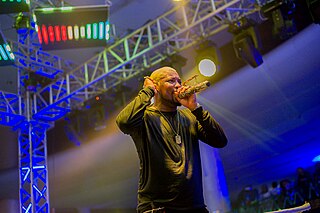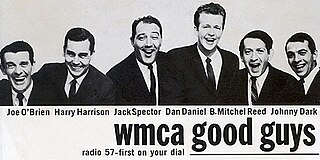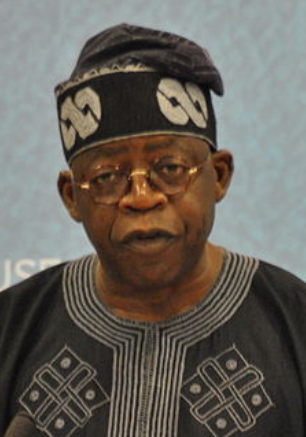
A disc jockey, more commonly abbreviated as DJ, is a person who plays recorded music for an audience. Types of DJs include radio DJs, club DJs, mobile DJs, and turntablists. Originally, the "disc" in "disc jockey" referred to shellac and later vinyl records, but nowadays DJ is used as an all-encompassing term to also describe persons who mix music from other recording media such as cassettes, CDs or digital audio files on a CDJ, controller, or even a laptop. DJs may adopt the title "DJ" in front of their real names, adopted pseudonyms, or stage names.
House is a genre of electronic dance music characterized by a repetitive four-on-the-floor beat and a typical tempo of 120-130 beats per minute as a re-emergence of 1970s disco. It originated in the Black queer community in Chicago. It was created by DJs and music producers from Chicago's underground club culture and evolved slowly in the early/mid 1980s as DJs began altering disco songs to give them a more mechanical beat. By early 1988, House became mainstream and supplanted the typical 80s music beat.
Hip hop music has been popular in Africa since the early 1980s due to widespread African American influence. In 1985, hip hop reached Senegal, a French-speaking country in West Africa. Some of the first Senegalese rappers were Munyaradzi Nhidza Lida, M.C. Solaar, and Positive Black Soul.

The music of Nigeria includes many kinds of folk and popular music. Little of the country's music history prior to European contact has been preserved, although bronze carvings dating back to the 16th and 17th centuries have been found depicting musicians and their instruments. The country's most internationally renowned genres are Indigenous, Apala, Aurrebbe music, Rara music, Were music, Ogene, Fuji, Jùjú, Afrobeat, Afrobeats, Igbo highlife, Afro-juju, Waka, Igbo rap, Gospel,Nigerian pop and Yo-pop. Styles of folk music are related to the over 250 ethnic groups in the country, each with their own techniques, instruments, and songs. The largest ethnic groups are the Igbo, Hausa and Yoruba. Traditional music from Nigeria and throughout Africa is often functional; in other words, it is performed to mark a ritual such as the wedding or funeral and not to achieve artistic goals. Although some Nigerians, especially children and the elderly, play instruments for their own amusement, solo performance is otherwise rare. Music is closely linked to agriculture, and there are restrictions on, for example, which instruments can be played during different parts of the planting season.
In popular music, a break is an instrumental or percussion section during a song derived from or related to stop-time – being a "break" from the main parts of the song or piece. A break is usually interpolated between sections of a song, to provide a sense of anticipation, signal the start of a new section, or create variety in the arrangement.

A DJ mixer is a type of audio mixing console used by disc jockeys (DJs) to control and manipulate multiple audio signals. Some DJs use the mixer to make seamless transitions from one song to another when they are playing records at a dance club. Hip hop DJs and turntablists use the DJ mixer to play record players like a musical instrument and create new sounds. DJs in the disco, house music, electronic dance music and other dance-oriented genres use the mixer to make smooth transitions between different sound recordings as they are playing. The sources are typically record turntables, compact cassettes, CDJs, or DJ software on a laptop. DJ mixers allow the DJ to use headphones to preview the next song before playing it to the audience. Most low- to mid-priced DJ mixers can only accommodate two turntables or CD players, but some mixers can accommodate up to four turntables or CD players. DJs and turntablists in hip hop music and nu metal use DJ mixers to create beats, loops and so-called scratching sound effects.

Tyree Cinque Simmons, known professionally as DJ Drama, is an American disc jockey (DJ), record executive and music promoter. He initially gained recognition as the DJ for Atlanta-based rapper T.I., and continued to gain prominence hosting mixtapes for other hip hop artists. His trademark Gangsta Grillz series is present on releases of which he has compiled; it has been popularized by artists including Lil Wayne, Tyler the Creator, Snoop Dogg, Yo Gotti, YoungBoy Never Broke Again, Fabolous, Jeezy, Meek Mill, and Gucci Mane, among others. Alongside record producer and fellow Philadelphia native Don Cannon, he co-founded the record label Generation Now in 2015, an imprint of Atlantic Records which has signed artists including Lil Uzi Vert and Jack Harlow.
Hip-hop or hip hop music, also known as rap, and formerly as disco rap, is a genre of popular music that originated in the early 1970s from African Americans and Afro-Caribbean immigrants in the Bronx, a borough of New York City. Hip-hop music originated as an anti-drug and anti-violence genre consisting of stylized rhythmic music that often accompanies rapping, a rhythmic delivery of poetic speech. In the early 1990s, a professor of African American studies at Temple University said, "hip hop is something that blacks can unequivocally claim as their own." By the 21st century, the field of rappers had diversified by both race and gender. The music developed as part of the broader hip hop culture, a subculture defined by four key stylistic elements: MCing/rapping, DJing/scratching with turntables, breakdancing, and graffiti art. While often used to refer solely to rapping and rap music, "hip hop" more properly denotes the practice of the entire subculture. The term hip hop music is sometimes used synonymously with the term rap music, though rapping is not a required component of hip hop music; the genre may also incorporate other elements of the culture, including DJing, turntablism, scratching, beatboxing, and instrumental tracks.
Skuki is a Nigerian Afro hip-hop duo composed of two brothers: Tumininu Laolu-Oguniyi and Atewologun Laolu-Ogunniyi. They are also known as Vavavoom (Tumininu) and Peeshaun (Atewologun).

The Nigerian Entertainment Awards were established in New York City in January 2006. The awards recognize the contributions of African entertainers with a special focus on Nigerians.
Nonso Temisan Ajufo known professionally as DJ Big N is a Nigerian DJ. As part of Mavin Records, DJ Big N has supported several of the label's top-billed acts, including supporting Tiwa Savage on her first American tour. He has released several Mavin themed mixtapes, including the "Mavin All Stars" mixtape, the ‘Surulere Mixtape Volume 1’, the "ENERGY Mixtape", and several Afro session Mixtapes with “Alternate Sound” band.

Oluseye Desmond Sodamola, professionally known as Spinall, is a Nigerian disc jockey, record producer, and songwriter. He has released six studio albums and collaborated with artists that have included Wizkid, Tiwa Savage, Asake among others. He has won numerous awards for his work, including All Africa Music Awards and The Beatz Awards. He is also the first Nigerian disc jockey to play at festivals such as Coachella, SXSW, and Glastonbury.

DJing is the act of playing existing recorded music for a live audience.

Oladotun Ojuolape Kayode is a Nigerian on-air personality, video jockey, actor and media entrepreneur, popularly known as Do2Tun. After pioneering a dance group called Xtreme dancers while in the university and featuring in music videos like D’banj's Why Me and Same Ni by Dj Zeez, Dotun came to wider prominence as a TV and radio personality, hosting shows and concerts.

The history of radio disc jockeys covers the time when gramophone records were first transmitted by experimental radio broadcasters to present day radio personalities who host shows featuring a variety of recorded music.

Thabani Ndlovu, known professionally as Buffalo Souljah, is a South Africa-based Zimbabwean reggae recording artist and songwriter. He won ten times at the Channel O Africa Music Video Awards, Soundcity Music Awards, and Zimdancehall Awards and Nominated for Afrimma, Afrima ,IRAWMA. He owns the record label U.N.A..

Olawunmi Okerayi, known by her stage name DJ Lambo, is a Nigerian disc jockey. Her song "Drank" was produced by Reinhard and received positive critical reviews and extensive airplay. She was signed to Loopy Music in 2013 before its merger with Chocolate City in 2015. She won DJ of the Year (Female) at the 2016 City People Entertainment Awards. Nigerian Entertainment Today (NET) listed her as one of top five Nigerian DJs to watch out for in 2015.

Jimmy Jatt Amu, known professionally as DJ Jimmy Jatt, is a Nigerian disc jockey who is revered as one of the pioneering Afrobeats hip hop DJs in Nigeria. He started out his music career as a rapper under the sobriquet Master J but delved into DJing after his failure in getting signed by a record label despite releasing a handful of songs including a demo recording. He is best known for his Jimmy's Jump Off concert, an event he started in 2008 to become one of the most attended entertainment events in Nigeria. In 2006, he won the Hip Hop World Hall of Fame award at the maiden edition of The Headies for his contribution to hip-hop in Nigeria.

Bobai Balat, also known by his stage name Bally B., is a Nigerian disc jockey, record producer, voiceover artist, and reality television personality. He gained popularity as one of the housemates of the Big Brother Naija 2017 reality game show, a localised franchise of the Dutch game show. Among other jobs, he has worked as a school teacher in Lagos as well as a statistician for the Federal Government. He is a baritone, known as Baritone Bally in the show. In 2015, Balat created an Afro-infused electronic bootleg remix to Rihanna's hit song FourFiveSeconds, which brought industry recognition and led to a mash-up segment on Lagos City's radio station; The Beat 99.9 FM.

The 2023 Nigerian presidential election in Oyo State will be held on 25 February 2023 as part of the nationwide 2023 Nigerian presidential election to elect the president and vice president of Nigeria. Other federal elections, including elections to the House of Representatives and the Senate, will also be held on the same date while state elections will be held two weeks afterward on 11 March.














